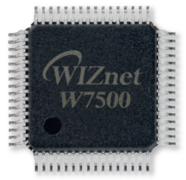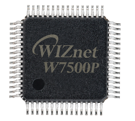w7500-spi2eth
A project that turns W7500 into a SPI-to-Ethernet bridge, where it acts as an SPI slave handling Ethernet communication on behalf of an external MCU.

Using W7500 as a SPI-to-Ethernet Bridge
An open-source project, w7500-spi2eth, demonstrates a method for configuring the WIZnet W7500 chip to operate as a SPI slave that handles Ethernet communication.
Instead of running as a standalone MCU that manages network stacks internally, the W7500 in this setup is dedicated solely to Ethernet frame transmission and reception, based on commands received over SPI.
Project Overview
W7500 functions as an SPI slave, receiving commands from an external MCU Communicates using MACRAW socket mode, allowing direct handling of raw Ethernet frames Implemented commands include: SEND_FRAME, RECV_FRAME, SET_MAC, RESET_PHY, GET_IRQ, etc.
When This Architecture Is Preferable
1. When the external MCU cannot support a TCP/IP stack
MCUs with limited resources (e.g. 8-bit or bare-metal architectures) may not be capable of running embedded TCP/IP stacks such as lwIP.
In such cases, offloading Ethernet processing to the W7500 allows the main MCU to act only as a data source over SPI.
2. When a customizable network bridge is required
The W5500 offers reliable and fixed SPI-based access to TCP/IP functions, but its protocol and behavior are largely hardware-defined.
W7500 allows firmware-level control, enabling developers to implement custom packet formats, interrupt handling mechanisms, or PHY control routines.
3. When a modular SPI-to-Ethernet design is preferred
For systems where the network interface must be modularized or separated from the main processor, W7500 provides an efficient solution.
In particular, the W7500P variant includes an integrated PHY, allowing SPI, TCP/IP, MAC, and PHY to be handled within a single IC.
4. When non-standard SPI protocols are required
Unlike W5500, which operates on a fixed command/address/data SPI protocol defined by WIZnet,
W7500 firmware can be customized to support arbitrary SPI command sets.
This enables additional control commands, framing schemes, or error/status reporting features.
Comparison with W5500
| Feature | W5500 | W7500 (as SPI Bridge) |
|---|---|---|
| Core Function | Dedicated TCP/IP controller | TCP/IP Offload Engine + MCU |
| SPI Protocol | Fixed, hardware-defined | Fully customizable in firmware |
| MCU Requirement | Required | Optional (can operate standalone or as slave) |
| MACRAW Support | Supported | Supported with programmable handling |
| PHY | Integrated (fixed) | Integrated only in W7500P variant |
| Customization | Limited | High (protocol and logic configurable) |
Conclusion
The w7500-spi2eth project illustrates a flexible alternative to conventional MCU + Ethernet controller configurations.
By using the W7500 as a dedicated SPI-to-Ethernet bridge, systems can offload complex networking tasks, customize SPI communication logic, and reduce component count—especially when using the W7500P variant with integrated PHY.
This approach is particularly useful in embedded systems that require modular Ethernet connectivity or demand greater control over protocol behavior.


